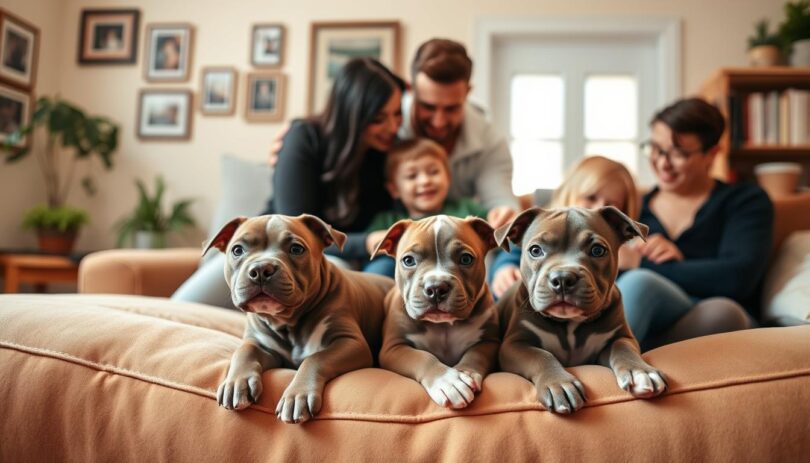Are you considering bringing a new furry friend into your home? Baby pitbulls are quickly becoming a favorite among families, and it’s easy to see why. With their charming personalities and affectionate nature, these puppies can bring immense joy to your household. Whether you’re a seasoned pet owner or a first-time dog parent, understanding their unique needs is key to raising a happy and healthy companion.
In this article, we’ll delve into the essential aspects of caring for your baby pitbull. From their dietary needs to training tips, we’ll cover it all. You’ll also find expert-backed advice to help you navigate the journey of pet parenthood. Our goal is to empower you with the knowledge to create a loving and nurturing environment for your new family member.
By the end of this guide, you’ll be well-equipped to provide the care and attention your baby pitbull deserves. Let’s get started on this exciting adventure together!
Discovering the Unique Charm of Baby Pitbulls
Meet the newest addition to many families: the baby pitbull. Known for their playful and loyal nature, these puppies are quickly winning hearts across the country.
Personality Traits and Characteristics
Pitbulls are known for being loyal and affectionate. They love spending time with their families and are always eager to play. Their friendly nature makes them great companions for both kids and adults.
Experts often highlight their intelligence, which makes training easier. With patience, they can learn tricks and commands quickly. This intelligence, combined with their energy, means they need plenty of exercise and mental stimulation.
Why They Make Great Family Pets
One of the best things about pitbulls is how well they fit into families. They are naturally good with children and can get along with other pets if socialized properly. Their calm and patient nature helps them adapt to busy family life.
Studies show that having a dog like a pitbull can improve your mental and emotional health. They provide comfort and reduce stress, making them a loving addition to any home.
Training is key to helping your pitbull grow into a well-behaved dog. Start with simple commands and positive reinforcement. Consistency will help them learn fast and become a respectful member of your family.
With the right care, your pitbull can be a happy and healthy part of your family. Their loyal and playful nature makes them a great choice for many pet owners.
Essential Care and Health Tips for Your Baby Pitbull
Welcoming a new puppy into your home is an exciting experience, but it comes with responsibilities. Ensuring your baby pitbull stays healthy and happy requires attention to their nutrition, exercise, and grooming. Let’s explore these essential care tips to help you provide the best for your furry friend.
Nutrition and Veterinary Considerations
A balanced diet is crucial for your puppy’s growth. High-quality dog food tailored to their age and size is recommended. Regular veterinary checkups and vaccinations are vital to prevent illnesses. For more insights on feeding your pitbull, visit this resource.
Consult your vet to create a feeding schedule and monitor portion sizes to avoid obesity, a common issue in pitbulls.
Daily Exercise and Playtime
Your puppy needs at least 45 minutes of exercise daily. Activities like walks, runs, and playtime in the park support physical and mental health. Interactive toys and training sessions can keep them stimulated and happy.
Grooming and Basic Care Guidelines
Regular grooming is essential for skin and coat health. Brush your puppy weekly to manage shedding. Baths should be occasional, and nail trimming should be done carefully to avoid pain. Ear cleaning is also important to prevent infections.
Effective Training and Socialization Strategies
Training and socialization are crucial for helping your puppy grow into a well-adjusted and obedient companion. With the right approach, you can ensure your dog develops good behavior and strong social skills.
Fundamental Training Techniques for Puppies
Start with basic commands like “sit,” “stay,” and “come.” Use positive reinforcement, such as treats and praise, to encourage good behavior. Consistency is key—set clear rules and stick to them.
For more guidance, visit this resource for expert tips on puppy training.
Socializing with Other Dogs and Environments
Early socialization helps your puppy become confident and calm in new situations. Introduce them to various environments, people, and other animals to reduce anxiety and aggression.
Playdates with other dogs and visits to parks can make socialization fun and effective. These experiences help your puppy interact well with others and build a strong bond with you.
Embracing a Happy Future with Your Furry Friend
As you embark on this joyful journey with your new furry companion, remember that every moment is an opportunity to nurture and grow together. Your puppy’s happiness and health are reflections of the love and care you provide. By following expert advice and staying engaged with resources like comprehensive training guides, you can ensure your dog leads a fulfilling life.
Regular grooming, balanced nutrition, and consistent training are essential for your puppy’s well-being. Socialization and playtime not only strengthen your bond but also contribute to their emotional and mental growth. Surround your dog with a loving environment and continue seeking knowledge to enhance your pet care skills.
Join a supportive community of pet owners to share experiences and learn from one another. Together, we can create a world where every dog thrives. Embrace the future with optimism, knowing you’re giving your furry friend the best life possible.
FAQ
How much exercise does a pit bull puppy need daily?
Pit bull puppies require about 1-2 hours of exercise daily. This includes walks, playtime, and training sessions to keep them physically and mentally stimulated.
What are the best training techniques for a pit bull?
Positive reinforcement is highly effective. Use treats, praise, and consistency to encourage good behavior. Avoid harsh methods to foster a positive learning environment.
How often should I groom my pit bull?
Pit bulls have a short coat, so grooming once a week is sufficient. This includes nail trimming, ear cleaning, and brushing to maintain their coat’s health.
Are pit bulls good with other pets?
With proper socialization, pit bulls can get along well with other pets. Introduce them slowly and under controlled circumstances to ensure harmony.










Leave a Comment